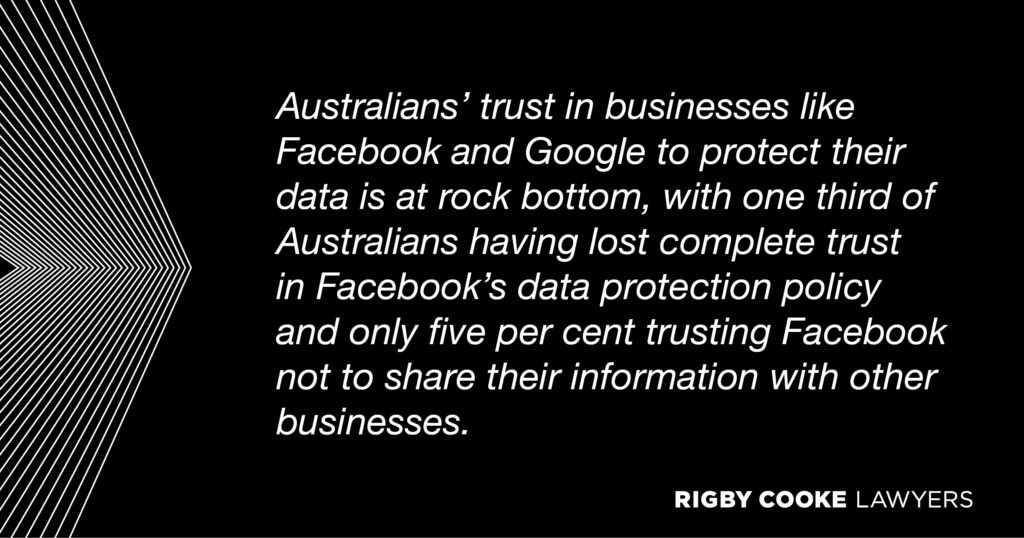As Privacy Awareness Week 2021 draws to a close, Rigby Cooke Lawyers are sharing the results of research recently undertaken by Kantar Australia on behalf of the firm, and what this means for businesses.
The research reveals that Australians’ trust in businesses to protect their data is at rock bottom, with one third of Australians surveyed having lost complete trust in Facebook’s data protection policy and only five per cent trusting Facebook not to share their information with other businesses. Despite the lack of trust, Australians continue to use both platforms in high numbers. Our research has highlighted not only a significant lack of awareness and consumer understanding of how personal information is used, stored and shared, but also of Australia’s privacy laws itself.
The data (highlights detailed below) shows us that while Australians are still using Facebook and Google, the trust in these types of platforms and other organisations is seriously low – particularly in relation to how personal information is used, stored and shared. On top of that, we are seeing that there are significant national knowledge gaps when it comes to the laws surrounding personal information privacy.
Survey key findings based on the sample group:
- 58% of Australians are unaware of the laws surrounding personal information privacy
- Over half of Australians (59%) lack trust in the organisations they interact with to safeguard their personal information
- 62% of Australians are unsure where their personal data is stored, and only ten per cent believe that companies are transparent in how they use our personal data
- Only 5% of Australians trust Facebook not to share personal information with other organisations
- 97% of Australians believe that Facebook is not transparent in relation to how it collects and uses their personal data
- 96% of Australians believe Google is not transparent in relation to how it collects and uses personal data
- 64% of Australians were not aware that there is not currently a personal ‘right to privacy’, clearly showing the gap in understanding that needs to be bridged.
The reality is that in many cases, business practices and the law have struggled to keep pace with advancements in technology. This is clearly evident where personal information and privacy is concerned. The use of COVID apps requiring people to check-in using their details at a range of businesses – large and small – has supercharged this even further.
The current review of the Privacy Act 1988 (Cth) and the resulting actions are critical in ensuring that laws can try to keep pace with change and consumer attitudes. From our research, Australians want greater transparency and accountability from businesses when it comes to how they use our personal information. They also want to know their information is securely stored.
Businesses that understand consumer expectations have the best opportunity to build strong relationships with their customers and clients by giving them the confidence to share more openly. This maximises the benefit of information sharing. With that valuable information, organisations are better placed to provide their products and services and in the way that their customers and clients want.
However, to ensure the legislation is as effective as it can be, it is equally important that the public is proportionately educated on their responsibilities and the responsibilities of businesses who hold personal information are, helping Australians to make informed decisions about their privacy and their data.
What does this mean for businesses?
While there continues to be a gap between consumer attitudes and the law, businesses must continue to improve their efforts to be transparent as to how they collect, use and share personal information. Building trust and meeting expectations is important to the successful engagement of customers and other stakeholders.
Businesses must ensure they minimise unexpected collections, uses and disclosures of personal information by:
- taking steps to understand the attitude and expectations of their stakeholders in relation to how personal information is handled;
- having in place a concise and easily accessible Privacy Policy that complies with the mandatory requirements of the Privacy Act.
- informing individuals when they collect personal information by giving them a concise and transparent Collection Notice;
- ensuring third parties with which they share personal information (including contractors and technology providers) protect their personal information; and
- providing training to staff so that they understand their obligations under the Privacy Act and personal information is handled accordingly.
Rigby Cooke Lawyers understands a practical, tailored approach to privacy compliance is important, and can assist your business balance its obligations, while also maximising the potential of the information that you hold.
Please get in touch with our Privacy & Data Protection team if you would like to discuss further.
| Disclaimer: This publication contains comments of a general nature only and is provided as an information service. It is not intended to be relied upon as, nor is it a substitute for specific professional advice. No responsibility can be accepted by Rigby Cooke Lawyers or the authors for loss occasioned to any person doing anything as a result of any material in this publication.
Liability limited by a scheme approved under Professional Standards Legislation. ©2021 Rigby Cooke Lawyers |
